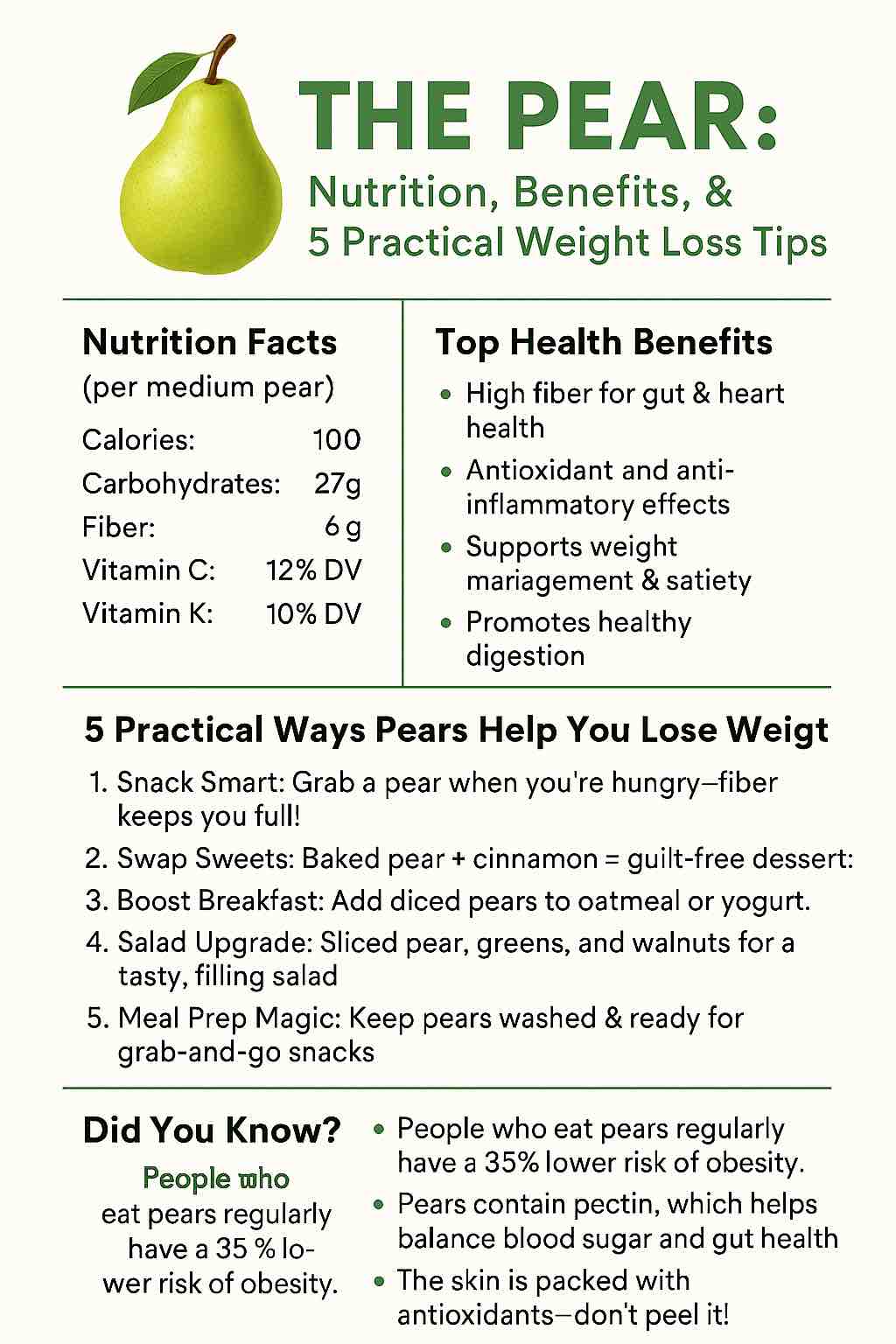
When we think of weight loss superfoods, the humble pear is often overlooked in favor of trendy berries or exotic seeds. But science is catching up—and the verdict is in: pears are nutritional powerhouses with unique benefits for weight management and overall health. From their juicy bite to their high-fiber punch, pears offer more than just a sweet snack. Let’s dive into the science, the benefits, and—most importantly—how you can use pears in your daily routine for real, lasting results.
1. Pear Nutrition: More Than Just a Sweet Treat
Pears are nature’s dessert—with substance! Here’s what you get in one medium pear (about 178g):
- Calories: 100–102
- Carbs: 27g (of which 6g is fiber, 16g natural sugars)
- Protein: 1g
- Fat: 0g
- Vitamin C: 12–15% DV
- Vitamin K: 10% DV
- Potassium: 6% DV
- Copper, Magnesium, Folate: Small but meaningful amounts
Key Feature: The skin is rich in soluble fiber (pectin) and antioxidants—so always eat your pear whole!
2. Proven Health Benefits of Pears (Latest Research)
2.1. Weight Management and Satiety
- Fiber Power: A pear packs up to 24% of a woman’s daily fiber needs. Fiber slows digestion, controls blood sugar, and keeps you full longer.
- Low Energy Density: You can eat more pears for fewer calories compared to calorie-dense snacks, supporting a calorie deficit.
- Clinical Evidence: Recent trials (2024–2025) show that eating a pear before meals can reduce total calorie intake and support gradual, sustainable weight loss.
2.2. Gut and Heart Health
- Pectin: Pears are among the richest sources of pectin, a soluble fiber that feeds healthy gut bacteria, lowers cholesterol, and helps regulate bowel movements.
- Gut Microbiome: Cutting-edge studies show pear pectin boosts the growth of good bacteria, reduces inflammation, and improves insulin sensitivity.
2.3. Blood Sugar and Diabetes Control
- Low Glycemic Index: Pears have a GI of about 38—gentle on blood sugar.
- Polyphenols & Anthocyanins: Pears’ colorful skins are packed with bioactive compounds that fight oxidative stress, reduce diabetes risk, and help control appetite.
2.4. Immune Support
- Antioxidants: Vitamin C and flavonoids in pears strengthen immunity and protect cells from damage.
- Copper: Supports red blood cell production and nervous system health.
3. 5 Practical Ways to Use Pears for Weight Loss (That Actually Work)
1. The Pre-Meal Pear Trick
Eat one whole pear (with skin) 30–45 minutes before lunch or dinner.
Why: The fiber and water volume signal fullness to your brain, making it easier to say “no” to seconds or calorie-dense entrees.
Pro Tip: Keep pears visible on your counter as a healthy reminder!
2. Swap Sweets with Smart Pear Snacks
Craving dessert? Try these:
- Baked pear with cinnamon and a sprinkle of nuts
- Sliced pear with plain Greek yogurt
- Pear “nachos” (thin slices, peanut butter drizzle, chia seeds)
Why: You satisfy your sweet tooth, add nutrients, and avoid empty calories from cakes, cookies, and ice cream.
3. Upgrade Breakfast for Lasting Energy
Add diced pear to oatmeal, high-fiber cereal, or a smoothie.
Why: This raises your meal’s fiber content and provides natural sweetness, curbing the urge to snack mid-morning.
4. Make Salads You’ll Actually Crave
Pair thin-sliced pear with leafy greens, walnuts, a sprinkle of feta, and a simple vinaigrette.
Why: The crunch and sweetness balance savory flavors, making salads filling (and never boring).
5. Meal Prep and Snack Smart
Wash, slice, and store pears in the fridge for grab-and-go snacking.
Why: You’re less likely to reach for chips or cookies when healthy snacks are ready and visible.
4. Pro Tips for Getting the Most from Pears
- Eat the Skin! Most of the fiber and antioxidants are found here.
- Choose Colorful Varieties: Red or purple-skinned pears contain more anthocyanins—linked to lower diabetes and obesity risk.
- Mix & Match: Try different varieties—Bartlett, Bosc, Anjou—for flavor and nutrient diversity.
- Pair with Protein: Team pears with nuts or cheese for an even greater satiety boost.
- Stay Hydrated: Pears have high water content—great for hydration and fullness.
5. Who Should Watch Their Pear Intake?
- Low-FODMAP Dieters: Pears are high in fructose, which may trigger symptoms in those with IBS.
- Diabetics: Pears are diabetic-friendly in moderation, but portion size matters.
- Allergic Individuals: Pear allergy is rare, but always exercise caution with new foods.
6. The Latest Science: What’s New in 2024–2025?
- Clinical studies highlight pears’ pectin as a standout fiber for controlling appetite, improving blood sugar, and lowering cholesterol.
- Population studies show that regular pear eaters have a 35% lower risk of obesity and significantly improved diet quality.
- Bioactive compounds like anthocyanins and polyphenols in pears are now linked to reduced risk of type 2 diabetes and chronic inflammation.
Conclusion: The Takeaway
Pears are a simple, affordable, and delicious addition to any weight loss plan. Backed by solid science, they help you eat less, feel full, and support gut and metabolic health. Whether you’re snacking smart, boosting breakfast, or swapping out sweets, the pear belongs at the center of your healthy diet.
Ready to Make Pears a Habit?
- Start small: Add one pear a day for a week and notice the difference in hunger and cravings.
- Try new recipes: Experiment with pears in smoothies, salads, or as baked desserts.
- Share your story: Did eating pears help you lose weight or feel better? Share your experience below!
Don’t just read—give the pear a try. Your waistline (and taste buds) will thank you!
FAQs: Pears, Nutrition, and Weight Loss
1. Are pears good for weight loss?
Yes. Pears are low in calories, high in fiber, and contain water—helping you feel full with fewer calories. Studies show regular pear eaters are less likely to be overweight.
2. Should I eat pears with the skin on?
Absolutely! Most of the fiber, antioxidants, and nutrients are in the skin. Wash pears well and eat them whole for maximum benefits.
3. How many pears should I eat per day for weight loss?
1–2 pears per day is a practical amount. Eating one pear before meals or as a snack can help reduce overall calorie intake.
4. Do pears have a high sugar content?
Pears have natural sugars, but their high fiber and low glycemic index (about 38) help prevent blood sugar spikes.
5. Can people with diabetes eat pears?
Yes, in moderation. Pears’ fiber and low glycemic load make them suitable for diabetics, but portion control is important.
6. Are there differences between pear varieties?
Yes. Bartlett, Bosc, Anjou, and Asian pears differ slightly in taste and color, but all are nutritious. Red and purple-skinned pears contain more anthocyanins (antioxidants).
7. Is it okay to eat pears if I have digestive issues or IBS?
Pears are high in fructose and FODMAPs, which can trigger symptoms in some people with IBS. If you’re sensitive, try smaller portions or consult your doctor.
8. How do pears help with gut health?
Their pectin (soluble fiber) feeds good gut bacteria, eases constipation, and supports a healthy microbiome.
9. What are some easy ways to add pears to my diet?
Eat as a snack, slice into oatmeal or yogurt, toss in salads, or bake with cinnamon as a healthy dessert.
10. Can I lose weight just by eating more pears?
No single food causes weight loss, but pears are a helpful, satisfying tool as part of a balanced diet and active lifestyle.













